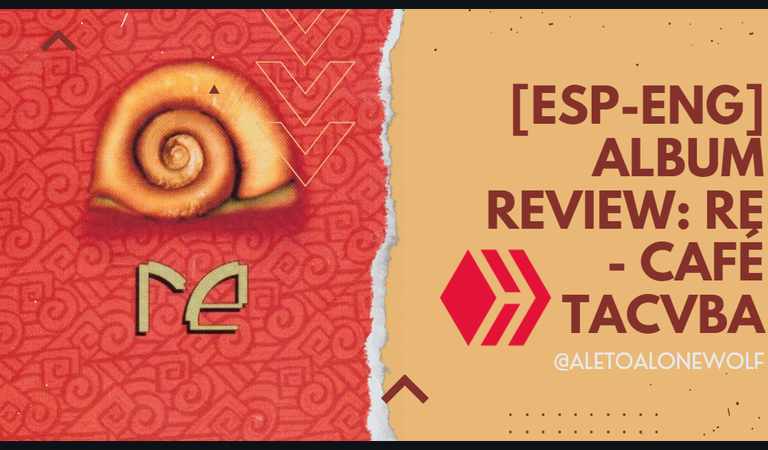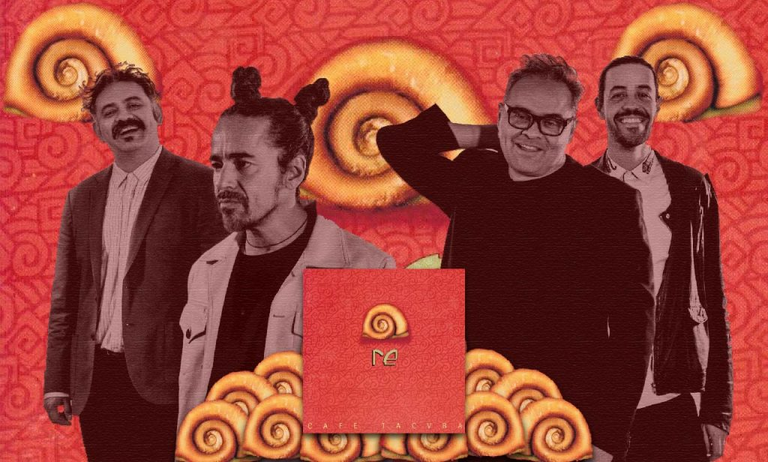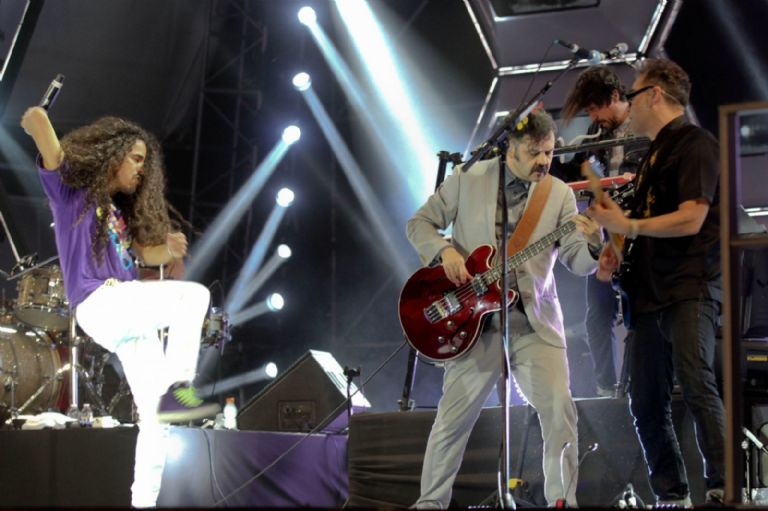[Esp-Eng] Album review: Re - Café Tacvba

Este es un disco que se lanzó en 1994 y que fue producido por Gustavo Santaolalla, un reconocido músico y productor argentino. El álbum es considerado una obra maestra del rock latinoamericano, ya que muestra la diversidad y la riqueza musical de México y de América Latina en general. En él, Café Tacvba experimenta con diferentes géneros, desde el rock, el punk, el funk y el grunge, hasta el huapango, el trío, la banda y el mambo. El resultado es un disco ecléctico, original, innovador y lleno de energía, que refleja la identidad y la creatividad de la banda. El álbum contiene 20 canciones, algunas de las cuales se han convertido en clásicos del rock en español, fue muy bien recibido por la crítica y el público, y ha sido comparado con el White Album de The Beatles por su variedad y calidad. La revista Rolling Stone lo nombró el mejor álbum latinoamericano de la historia del rock.
La inspiración de este álbum fue la diversidad y la riqueza musical de México y de América Latina, así como la búsqueda de la identidad y la creatividad de la banda. Café Tacvba quería mostrar su capacidad de abordar géneros muy distintos, desde el rock, el punk, el funk y el grunge, hasta el huapango, el trío, la banda y el mambo. También querían reflejar su origen mestizo, que se expresa en el nombre de la banda, que combina el café traído por los europeos y la palabra náhuatl Tacuba. El álbum fue producido por Gustavo Santaolalla, quien los impulsó a escribir más canciones y a experimentar con diferentes sonidos e instrumentos. El resultado fue un disco ecléctico, original, innovador y lleno de energía, que ha sido considerado una obra maestra del rock latinoamericano.
This is an album that was released in 1994 and was produced by Gustavo Santaolalla, a renowned Argentinean musician and producer. The album is considered a masterpiece of Latin American rock, as it shows the diversity and musical richness of Mexico and Latin America in general. In it, Café Tacvba experiments with different genres, from rock, punk, funk and grunge, to huapango, trio, banda and mambo. The result is an eclectic, original, innovative and energetic album that reflects the band's identity and creativity. The album contains 20 songs, some of which have become classics of rock en español, was very well received by critics and the public, and has been compared to The Beatles' White Album for its variety and quality. Rolling Stone magazine named it the best Latin American album in the history of rock.
The inspiration for this album was the diversity and musical richness of Mexico and Latin America, as well as the band's search for identity and creativity. Café Tacvba wanted to show their ability to tackle very different genres, from rock, punk, funk and grunge, to huapango, trio, banda and mambo. They also wanted to reflect their mestizo origin, which is expressed in the band's name, which combines the coffee brought by the Europeans and the Nahuatl word Tacuba. The album was produced by Gustavo Santaolalla, who encouraged them to write more songs and experiment with different sounds and instruments. The result was an eclectic, original, innovative and energetic album, which has been considered a masterpiece of Latin American rock.
Reseña/Review

El aparato: Es la primera canción del álbum, y es una de las más experimentales y vanguardistas de la banda. Es una canción que mezcla el rock con el ambient y el noise, y que utiliza sonidos e instrumentos poco convencionales, como un theremin, un sintetizador, una sierra y una aspiradora. La letra es una metáfora sobre la alienación y la opresión que ejerce la tecnología y el sistema sobre el individuo. La canción fue compuesta por Rubén, el vocalista de la banda, y es una de las más oscuras y complejas de su repertorio.
La ingrata: Es una canción que mezcla el rock con la música norteña, y que cuenta la historia de un hombre que sufre por el desamor de una mujer que lo engaña y lo abandona. La letra es irónica y humorística, y la música es muy pegajosa y bailable. La canción fue un éxito en México y en otros países, y se convirtió en un himno del rock en español
El ciclón: Es la tercera canción del álbum, y es una de las más rockeras y energéticas de la banda. Es una canción que mezcla el rock con el funk, y que habla de la fuerza y el movimiento de un ciclón que arrasa con todo a su paso. La letra es muy metafórica y dinámica, y la música es muy potente y bailable. La canción fue compuesta por Rubén, el vocalista de la banda, y fue el primer sencillo del disco.
El borrego: Es la cuarta canción del álbum, y es una de las más pesadas y agresivas de la banda. Es una canción que imita el estilo del heavy metal, y que habla de la rebelión y la resistencia de un borrego que se enfrenta al sistema y a la autoridad. La letra es muy crítica y desafiante, y la música es muy ruidosa y distorsionada. La canción fue compuesta por Joselo, el guitarrista de la banda, y fue una de las más controversiales del disco.
Trópico de Cáncer: Es una canción que fusiona el rock con el samba brasileño, y que es una reflexión sobre la situación social y política de América Latina. La letra es una crítica a la pobreza, la violencia, la corrupción y la explotación que sufren los países latinoamericanos por parte de las potencias mundiales. La música es muy rítmica y melódica, y cuenta con la participación de un grupo de percusionistas brasileños llamado Olodum. La canción fue compuesta por Meme, el tecladista de la banda, y es una de las más comprometidas y profundas del álbum.
Madrugal: Es la undécima canción del álbum, y es una de las más simples y minimalistas de la banda. Es una canción que imita el estilo de la música de trío, y que habla de la soledad y el desvelo de un hombre que no puede dormir. La letra es muy breve y poética, y la música es muy tranquila y acústica. La canción fue compuesta por Meme, el tecladista de la banda, y fue una de las más cortas del disco.
La negrita: Es la decimocuarta canción del álbum, y es una de las más folclóricas y tradicionales de la banda. Es una canción que imita el estilo de la música de huapango, y que habla de la belleza y el encanto de una mujer morena que baila y canta. La letra es muy elogiosa y festiva, y la música es muy típica y regional. La canción fue compuesta por Quique, el bajista de la banda, y fue una de las más mexicanas del disco.
Las flores: Es una canción que combina el rock con el ska jamaiquino, y que habla de un amor puro y sincero que se expresa con flores. La letra es muy romántica y poética, y la música es muy alegre y festiva. La canción fue compuesta por Meme, el tecladista de la banda, y es una de las primeras que el público le conoció.
El baile y el salón: Es una canción que fusiona el rock con el mambo, y que narra la historia de una pareja que se conoce y se enamora en un baile. La letra es muy divertida y desenfadada, y la música es muy rítmica y bailable. La canción fue un éxito en México y en otros países, y se convirtió en un clásico del rock en español.
El puñal y el corazón: Es una canción que imita el estilo de los tríos románticos, y que cuenta la historia de un hombre que sufre por el amor de una mujer que lo rechaza. La letra es muy dramática y triste, y la música es muy melancólica y sentimental. La canción fue la última del disco, y fue una sorpresa para los fans de la banda, que no esperaban escucharlos en ese género
El aparato: This is the first song on the album, and it is one of the band's most experimental and avant-garde songs. It is a song that mixes rock with ambient and noise, and uses unconventional sounds and instruments, such as a theremin, a synthesizer, a saw and a vacuum cleaner. The lyrics are a metaphor for the alienation and oppression that technology and the system exert on the individual. The song was composed by Rubén, the band's vocalist, and is one of the darkest and most complex in their repertoire.
La ingrata: It is a song that mixes rock with norteño music, and tells the story of a man who suffers from the heartbreak of a woman who cheats on him and abandons him. The lyrics are ironic and humorous, and the music is very catchy and danceable. The song was a hit in Mexico and other countries, and became a rock en español anthem.
El ciclón: This is the third song on the album, and is one of the band's most rocking and energetic songs. It is a song that mixes rock with funk, and speaks of the force and movement of a cyclone that sweeps everything in its path. The lyrics are very metaphorical and dynamic, and the music is very powerful and danceable. The song was composed by Rubén, the band's vocalist, and was the first single from the album.
El borrego: This is the fourth song on the album, and is one of the heaviest and most aggressive of the band. It is a song that imitates the heavy metal style, and talks about the rebellion and resistance of a sheep that confronts the system and authority. The lyrics are very critical and defiant, and the music is very loud and distorted. The song was composed by Joselo, the band's guitarist, and was one of the most controversial songs on the album.
Trópico de Cáncer: It is a song that fuses rock with Brazilian samba, and is a reflection on the social and political situation in Latin America. The lyrics are a critique of the poverty, violence, corruption and exploitation suffered by Latin American countries by the world powers. The music is very rhythmic and melodic, and features the participation of a group of Brazilian percussionists called Olodum3. The song was composed by Meme, the band's keyboardist, and is one of the most committed and profound songs on the album.
Madrugal: This is the eleventh song on the album, and is one of the band's simplest and most minimalist songs. It is a song that imitates the style of trio music, and talks about the loneliness and sleeplessness of a man who cannot sleep. The lyrics are very short and poetic, and the music is very calm and acoustic. The song was composed by Meme, the band's keyboardist, and was one of the shortest songs on the album.
La negrita: This is the fourteenth song on the album, and is one of the band's most folkloric and traditional songs. It is a song that imitates the style of huapango music, and speaks of the beauty and charm of a dark-haired woman who dances and sings. The lyrics are very complimentary and festive, and the music is very typical and regional. The song was composed by Quique, the band's bass player, and was one of the most Mexican songs on the album.
Las flores: It is a song that combines rock with Jamaican ska, and talks about a pure and sincere love that is expressed with flowers. The lyrics are very romantic and poetic, and the music is very cheerful and festive. The song was composed by Meme, the band's keyboardist, and is one of the first songs that the public came to know.
El baile y el salón: It is a song that fuses rock with mambo, and tells the story of a couple who meet and fall in love at a dance. The lyrics are very funny and lighthearted, and the music is very rhythmic and danceable. The song was a hit in Mexico and other countries, and became a Spanish rock classic.
El puñal y el corazón: It is a song that imitates the style of romantic trios, and tells the story of a man who suffers for the love of a woman who rejects him. The lyrics are very dramatic and sad, and the music is very melancholic and sentimental. The song was the last one on the album, and it was a surprise for the band's fans, who did not expect to hear them in that genre.
Calificación/Rating

El álbum es considerado una obra maestra del rock latinoamericano, ya que muestra la diversidad y riqueza de la cultura y la música de esta región. Café Tacvba experimentó con diferentes géneros musicales, desde la música regional mexicana, como el trío, el huapango, la música norteña y banda, hasta otros tan diversos como el punk, el funk, el grunge, el mambo, el samba brasileño y el ska jamaiquino. El álbum también refleja la identidad y la búsqueda de los integrantes de la banda, que querían mostrar de dónde venían y lo que podían lograr con su música. “Re” es un álbum que ha trascendido las fronteras y las generaciones, y que sigue siendo un referente de la música latinoamericana. Por eso, le doy una calificación de 9.4. Todo lo que quieras de la música popular latinoamericana lo encuentras aquí, es un álbum atemporal que no deja indiferente a nadie, se nota el esfuerzo y cariño de los integrantes cuando las crearon, facilmente podría considerarse el álbum insignia de latinoamérica (es un poco exagerado este título, pero no es para menos). Sin más que agregar, me despido.
The album is considered a masterpiece of Latin American rock, as it shows the diversity and richness of the culture and music of this region. Café Tacvba experimented with different musical genres, from Mexican regional music, such as trio, huapango, norteño and banda music, to others as diverse as punk, funk, grunge, mambo, Brazilian samba and Jamaican ska. The album also reflects the identity and search of the band members, who wanted to show where they came from and what they could achieve with their music. "Re" is an album that has transcended borders and generations, and continues to be a benchmark for Latin American music. For that reason, I give it a rating of 9.4. Everything you want from Latin American popular music you can find it here, it is a timeless album that leaves no one indifferent, you can feel the effort and affection of the members when they created it, it could easily be considered the flagship album of Latin America (this title is a bit exaggerated, but it is not for less). Without further ado, I bid you farewell.
Translated with www.DeepL.com/Translator (free version)
Fuentes/Sources

Congratulations @aletoalonewolf! You have completed the following achievement on the Hive blockchain And have been rewarded with New badge(s)
Your next target is to reach 800 upvotes.
You can view your badges on your board and compare yourself to others in the Ranking
If you no longer want to receive notifications, reply to this comment with the word
STOPTo support your work, I also upvoted your post!
Check out our last posts:
Has sido curado por @visualblock / You've been curated by @visualblock
Bienvenidas delegaciones / Delegations welcome
Trail de Curación / Curation Trail
Vota por nuestro Testigo aliado - @hispapro / Vote for our allied Witness - @hispapro
Más información sobre el testigo aquí / More information about the witness here
Una importante reseña minuciosamente detallada acerca de este grupo musical y este álbum específico citas características le hicieron ser de colección. Gracias por compartir. Éxito.
Gracias a ti por tomarte la molestia de leerlo y estar atenta. De verdad que es la clase de contenido que me gusta hacer.
Gracias por dar a conocer estas agrupaciones musicales que muchos desconocemos y que muy poca publicidad y promoción mediática tienen. Saludos cordiales!
Café tacvba es una banda sumamente singular y de buena calidad. Este álbum merece ser conocido por todos.
De todos los temas el que más me gusta es Ingrata que la gente canta todo pulmón por lo pegajosa y divertida que suele ser tanto el ritmo como sus letras. Saludos amigo Jesús y Feliz inicio decembrino.
uno de mis temas favoritos también. Aunque hoy en día ya no la canten en sus conciertos, muchos la recuerdan con cariño.